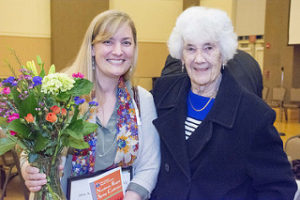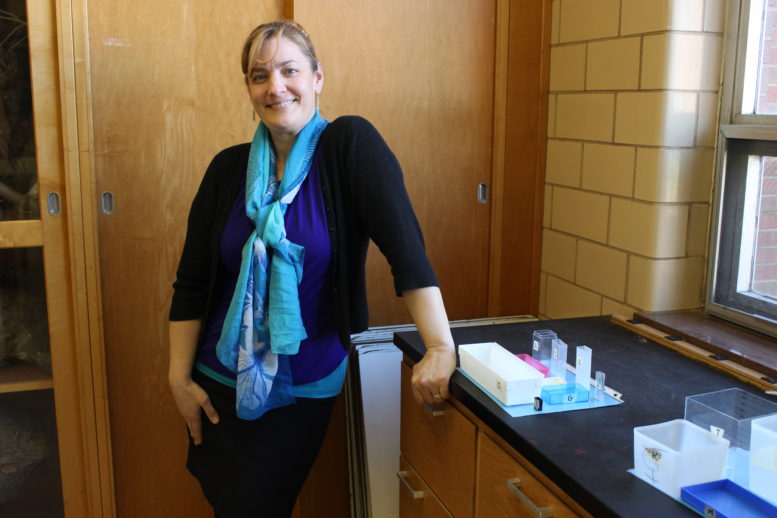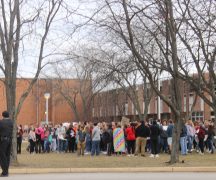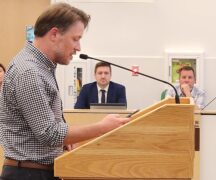By DAVID DUPONT
BG Independent News
Bowling Green teacher Gloria Gajewicz was inspired through her career by her own teachers, and further by her mother’s pursuit of education. So it is fitting that she should receive an award named for the late Neil Pohlmann, an educator and BGSU professor who left his mark on science education.
Earlier this month Gajewicz won the first Neil Pohlman Award given by Bowling Green State University at the spring conference of the Northwest Ohio School Boards Association meeting.
Patrick Pauken, director of the School of Educational Foundations, Leadership and Policy, said the award “is given in recognition of valuable contribution to Educational Administration and Leadership Studies at BGSU.”

Gloria Gajewicz with Mary Pohlmann, widow of science education professor Neil Pohlmann.
Gajewicz is working on her doctorate in the program. The award carries a scholarship.
Pauken wrote: “The faculty selected Gloria for the award because of her endless dedication to teaching, learning, and leading in our schools. She is an excellent graduate student, as well, inspiring her classmates with her professional stories of student success. Our classrooms and schools are special places, indeed, with teachers and leaders like Gloria Gajewicz.”
Gajewicz has taught science for 20 years, the last 16 at her alma mater, Bowling Green High School where she teaches biology and honors physical science.
Finishing her second semester of what she expects will be a four-year process, Gajewicz’s goal is to become a curriculum specialist with her particular interest in science.
She said she was inspired to pursue science by the many great science teachers she had in the Bowling Green system. That included Roger Mazzarella, “the wizard of Mazz,” in seventh grade and Bob Rex in eighth. In high school she had Bev Anthony for chemistry and Beth Snook for biology. “I had awesome science teachers all the way through,” she said. And she was pleased that when she started teaching in Bowling Green, Anthony was still on staff so she had “one of my inspirational teachers as a colleague.”
“They definitely inspired me to do something in science,” she said.
Her inspiration to go into teaching came even closer to home. While she was in high school her mother, Randye Kreischer, went to BGSU to get her education degree. She worked at Woodlane for 25 years. “It was interesting to see her do that,” Gajewicz said. “Having watched her go through that process inspired me to become a teacher.”
She got her undergraduate degree at BGSU, and then got her master’s in environmental biology from an Antioch College satellite campus in New Hampshire. “It had an awesome program,” she said. She took a break from teaching and devoted herself to getting her masters, then returned to Ohio.
As a teacher she believes strongly in a hands-on approach. “I use modeling instruction. It really flips things around,” Gajewicz said. Instead of giving students the equation and then sending them home to work out a set of problems, “I start with a lab. We try to pick it apart.”
That approach “gives them not just math skills, but problem solving skills, higher order thinking.”
She doesn’t believe in teaching to “the big state test.” Instead she believes if students have the analytical skills they can tackle unfamiliar material. “I’m more interested in the skills. It takes them further.”
The students work at white boards in peer review sessions, helping through their own discovery of the material and guided by Gajewicz’s questions, to present it to the class. It also allows her to better adjust her teaching for the different levels of understanding in the class, asking easier questions of students a bit behind, and challenging students who might otherwise be bored.
Pauken said he first met Gajewicz when she was demonstrating this method to a local Kiwanis Club. “She led local Kiwanians in mini science experiments to demonstrate the greatness of hands-on learning. Even more special was the fact that she brought several of her students with her to help the Kiwanians along the way.”
This approach has benefits for the teacher as well as the students. “That’s fun for me,” Gajewicz said. “It keeps me active, keeps me young, keeps me involved in the scientific process which is why I went into this in the first place.”





